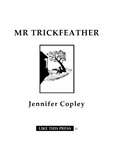reviewed by Anthony Adler
The Smell of Plums
I knew that I was in for a treat when I slid my review copy of Jennifer Copley’s Mr Trickfeather from the envelope in which it had arrived. Its cover is simple, delicate, striking, and enigmatic, printed on hand-torn manila stock that doesn’t quite conceal a gorgeous petticoat of ragged tissue endpapers. Compromises become character; the cover’s rough, frilled edges effectively counter the awkwardness of an untrimmed staple binding, making the ridge-shaped text block a feature rather than a flaw. Everything about this pamphlet communicates care, craft, and attention to detail: it promises the reader something special. Having read the pamphlet, though – and I promise, I will get to the text in just a little while – a single, querulous quibble raised its head. The blurb on the back of the pamphlet concludes that ‘Mainly [Mr Trickfeather] is a story about eccentricity, family and roots’, and this description somewhat took the wind from your reviewer’s sails; while it’s entirely true, by telling readers authoritatively that the pamphlet is about particular things rather than exploring those things, the blurb limits the scope of the text in much the same way as the eponymous Mr Trickfeather limits his own movements.
Home is somewhere to embrace and somewhere to escape; parents are to be loved and escaped; history may be laughed off, but casts shadows nonetheless.
But perhaps most readers are less swayed by blurbs that I am, even blurbs without grandiose and hyperbolic praise; and it is only a little quibble. I mostly raise it because the contrast between the blurb and the text operates by the same technique as much of the text itself. Mr Trickfeather comprises sixteen short prose vignettes, each paired with a small, well-judged illustration by Martin Copley. Together, they build a family history, step by step; and within each vignette the author’s sentences work in a step-wise fashion too. The first sentence of the book cantilevers an impressively nuanced world into being within the space of a few lines: ‘Once upon a time when the earth was flat, there lived a man who was so afraid of falling off the edge that he tied himself to the doorknob of his front door and never went anywhere but home.’ It introduces the central image of the collection, and gives a good demonstration of Jennifer Copley’s technique: writing in clear, uncomplicated language, she unpicks her own work as she goes along, nimbly reversing how the text frames its subjects in a manner that’s well-suited to both fable and family history. Home is somewhere to embrace and somewhere to escape; parents are to be loved and escaped; history may be laughed off, but casts shadows nonetheless.
Mr Trickfeather is neat and well crafted – Jennifer Copley demonstrates consummate control over her chosen form. It has a lot in common with Italo Calvino’s delightful and rather delighted novel Baron in the Trees, which takes as its starting point the decision of a young nobleman to exile himself to a forest canopy and continues until – well, that would be a spoiler. Copely’s narrative is both darker and more domestic than Calvino’s – there is more anxiety, less chivalric optimism, less space, and more detail – but Copley shares his wide-eyed, timeless sense of whimsy and his ability to sidestep the sentimentality that tends to emerge from it. Indeed, Copely portrays a world replete with a full range of mundane and mortal horrors, but she does so without becoming morbid or succumbing to pessimism. It is difficult to critically anatomise good cheer, but it is something that Copley conveys with considerable aplomb.
Calvino wrote that in the case of Baron in the Trees ‘[t]he tale [was] born from the image, not from any thesis which I want[ed] to demonstrate, and the image … developed in a story according to its own internal logic.’ He could be writing about Mr Trickfeather, whose only discernible argument is that history is multivalent and granular. If anything, it’s a fable tilting against didacticism and closed narratives, and as such it’s appropriately difficult to pin down Jennifer Copley’s position on anything at all. Where her vignettes focus on the malign influence of individuals or institutions, they do so without resorting reductively to caricature; they simply reflect the realities of the Trickfeathers’ lives, and resist being mapped onto any political or ideological spreadsheet. If anything, Copley seems most interested in subverting patriarchal and adult-centric cultural scripts, guying readers’ expectations in the deceptively simplifying authorial voice of a fairytale narrator. ‘Pearl Trickfeather’, we learn, ‘was not in the habit of keeping secrets from her sister until the day she decided to become an accountant’; later, we are informed that ‘A green-eyed girl was born in the early hours of a summer morning. No one knew if her mother was Pearl or Precious, not even God.’ Nobody – not a sister, not the eponymous Mr Trickfeather, not the reader, and not even God – ever sees the whole of any story through from its beginning to its end, or ever knows more than the half of it. All we have is a series of incidents strung beautifully like beads on a necklace, winking at us as they catch the light.
Anthony Adler is a poet, reviewer, playwright, and all-round busybody with more schemes than sense. He’s a member of the Burn After Reading collective, once stomped around the Southbank Centre performing ‘The Mask of Anarchy’, and is trying unsuccessfully to wean himself away from the word ‘deft’. He tweets as @AnthonyAdler.










